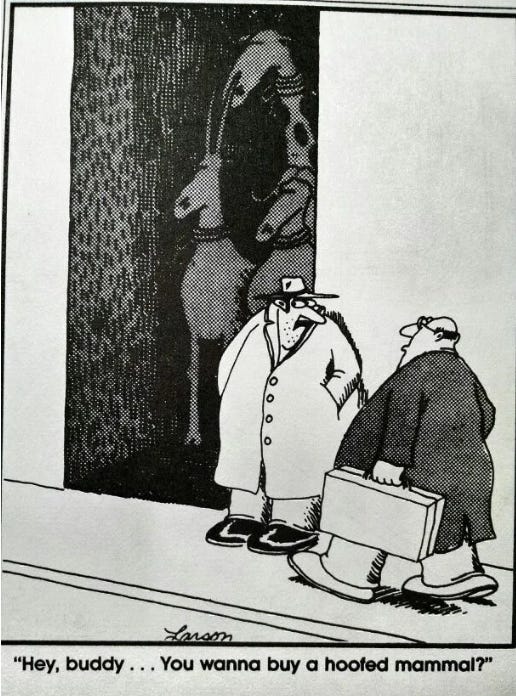Wanna Buy an Ungulate?
In yesterday’s daf (Bava Kamma 118), the Mishnah reads:
מַתְנִי׳ אֵין לוֹקְחִין מִן הָרוֹעִים – צֶמֶר וְחָלָב וּגְדָיִים, וְלֹא מִשּׁוֹמְרֵי פֵירוֹת – עֵצִים וּפֵירוֹת.
MISHNA: One may not purchase wool, milk, and kids from the shepherds who tend the flocks of others, due to the concern that they have stolen these items from the owners of the flocks. And similarly, one may not purchase wood and produce from produce watchmen.
אֲבָל לוֹקְחִין מִן הַנָּשִׁים – כְּלֵי צֶמֶר בִּיהוּדָה, וּכְלֵי פִשְׁתָּן בַּגָּלִיל, וַעֲגָלִים בַּשָּׁרוֹן. וְכוּלָּן שֶׁאָמְרוּ לְהַטְמִין – אָסוּר. וְלוֹקְחִין בֵּיצִים וְתַרְנְגוֹלִין מִכׇּל מָקוֹם.
But one may purchase from women woolen goods in Judea, and linen goods in the Galilee, and calves in the Sharon, as women in these locations often work with those commodities and it can be assumed that they are selling the items with the owner’s consent. And with regard to all these items, in a case where the seller told the buyer to conceal the purchase, it is prohibited, as there is good reason to suspect that the items are stolen. And one may purchase eggs and chickens from everywhere, as it is unlikely that one would steal and sell these commodities.
Artscroll translates it that where the seller told the buyer to conceal the purchase binds only the the immediately preceding case, of women selling these items. This kind of makes sense given that there is no allowance in the earlier cases in the Mishnah. But maybe it is still a far-reaching rule.
The idea of someone surreptitiously selling livestock called to mind this Far Side Cartoon:
I read that originally in a Gary Larson book, where he explained IIRC that the original was “buy an ungulate”, but then they changed it because people wouldn’t understand that an ungulate was a hoofed mammal.
On the daf, there is also an interesting Tosafot, which we won’t get into for time considerations.
The gemara had stated:
גְּמָ׳ אִיתְּמַר: ״מָנֶה לִי בְּיָדְךָ״, וְהַלָּה אוֹמֵר: ״אֵינִי יוֹדֵעַ״ – רַב הוּנָא וְרַב יְהוּדָה אָמְרִי: חַיָּיב, וְרַב נַחְמָן וְרַבִּי יוֹחָנָן אָמְרִי: פָּטוּר.
GEMARA: The Gemara cites a related dispute: It was stated that if one individual says to another: I have one hundred dinars in your possession, and the other says: I do not know whether or not this is true, Rav Huna and Rav Yehuda say that he is liable to pay the plaintiff, and Rav Naḥman and Rabbi Yoḥanan say that he is exempt from paying.
and Tosafot discuss how we rule in this two vs. two dispute - like Rav Nachman, since we rule like him in monetary matters. Also bringing in a related sugya in Bava Metzia daf 5, which occurs pretty soon, not just in daf yomi but given that the three Bavas are one long tractate called Nezikin. There, Rav Nachman speaks of an oath. So it is not just pure exemption. Also, they relate it to a discussion in Shevuot about drara demamona, where there is a lishna kamma and lishna batra, where usually we go after the second occurring text, when there is an ikka de’amrei indicating another variant. I won’t discuss it all, or even much, because of my time constraints. But here is Tosafot:
רב נחמן ורבי יוחנן אמרי פטור - וקי"ל כרב נחמן בדיני ופירש בקונטרס דמשביעין אותו שבועת היסת שאין יודע דלא עדיף מאילו היה כופר לגמרי ונראה דסובר בקונטרס כלישנא קמא דרב נחמן דפרק שבועת הדיינין (שבועות מ: ושם מא. ד"ה מאן) דארישא דקתני התם מנה לי בידך אין. לך בידי כלום פטור קאמר רב נחמן ומשביעין אותו . שבועת היסת אבל איכא דמתני לה אסיפא אמנה לי בידך וא"ל הן למחר א"ל תנהו לי נתתיו לך פטור דדוקא בסיפא דאיכא דררא דממונא קאמר ר"נ דמשביעין אותו שבועת היסת אבל ארישא לא וכן נראה הלכה כלשון הראשון דלישנא קמא סתמא דגמרא קאמר אבל לישנא בתרא רב חביבא הוא דמתני לה ובפ"ק דב"מ (דף ה. ושם ד"ה אין) גבי ההוא רעיא מייתי נמי לישנא קמא דר"נ אבל ר"ת אומר דמספק אין לחייבו שבועה היכא דליכא דררא דממונא כיון שיש ב' לשונות ובפ"ק דב"מ (שם) לאו דוקא נקט לישנא קמא דהא התם איכא דררא דממונא דאתו סהדי דאכיל תרי מינייהו ושמע ר"י שר"ת היה מניח לדיינין לחייב היכא דליכא דררא דממונא רק שהוא לא היה רוצה לדון כן היכא דמודה שחייב לו אלא שטוען לו פרעתי ראה ר"י ר"ת לחייב שבועה אע"ג דליכא עדים בההיא הודאה והיה יכול לכפור בשעה שטען שפרעתי ואמר דחשיב שפיר דררא דממונא כמו ההיא דנתתיו לך אע"ג דבהך הודאה יש עדים ולפי פשט הלכה משמע דלמאן דמתני אסיפא חשיב לה דררא דממונא משום דאיכא עדים בהודאה שא"ל אתמול הן ואין יכול עתה לכפור ורב האי גאון פי' כמו כן דלא משביעין ליה היכא דליכא דררא דממונא ומיהו משמתינן ליה על תנאי שיהא בשמתא אם הוא חייב ואינו מודה לו:


